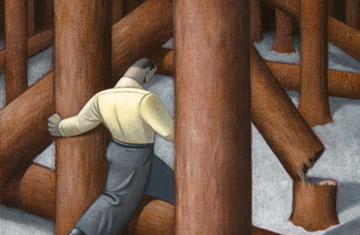
High winds on the last day of this year's annual meeting of the World Economic Forum in Davos prevented me from taking my usual run from the top of the Weissfluhjoch to Klosters, thinking on the way of what I'd learned during the week. I wasn't too upset. Deprived of my usual partner on the pistes — Martin Lukes, ex-CEO of a-b Glöbâl, who was unavoidably absent from this year's meeting — the long trail down into the village would not have been much fun. Instead, I donned cross-country skis and trudged from Davos up the sunless Dischma Valley. Within a few hundred meters, I'd left the apartment blocks and tourist shops of town, and was in a world where, not long ago, peasant farmers and transhumant cattle sustained each other in a way that had not changed in centuries. I'm reading Graham Robb's stunning new book The Discovery of France, and felt I was in one of those Savoyard valleys he describes where, deep into the 19th century, inhabitants hibernated through the long winter, huddled together with their cows for warmth, shut up in fuggy farmhouses against the bitter cold outside.
A gloomy thought, I will concede, but then this year's Davos began on a gloomy note, with the nosedive in Asian markets followed by the Fed's panicky 75 basis point cut in interest rates. I don't know if real bears can smack lips, but the ones at Davos certainly tried, outdoing each other in their predictions of the length and breadth of the coming U.S. slowdown. George Soros, for one, fretted that we were in the midst of the "worst market crisis in 60 years." In Davos, European schadenfreude for American woes of the moment always lurks just below the surface smiles, so there was also a certain grim satisfaction that Uncle Sam had got his comeuppance for years of profligacy. It didn't last. The final two days of the conference were overshadowed by the astonishing news that Jérôme Kerviel, a 31-year-old trader at Société Générale in Paris, had managed to lose one of France's most important banks $7.2 billion. Americans could mop their brows in relief; it wasn't, after all, just them that made a hash of their cash.
Like London or the Olympic Games, my Davos is not your Davos. With a couple of thousand people milling around the town and hundreds of official meetings, to say nothing of the unofficial ones in bars and restaurants, any view of the week is bound to be partial, so take these impressions for what they are — just that. But pretty much everyone would agree that the economic crisis dominated this year's Davos. In endless discussions, politicians and pundits lined up to say either (most of the politicians) that the fundamentals of the global economy were sound, or (many of the pundits) that the long boom in U.S. consumption had run its course, and hence that the essential locomotive of world growth had run out of puff. British Prime Minister Gordon Brown, during a short question-and-answer with Forum president Klaus Schwab, came across as a lot more sensible than most, both warning the audience not to celebrate a few silver linings in the gathering clouds, and setting out a menu of choices around which policy could coalesce — such as a continued commitment to free trade, and a real determination to reform the international financial institutions so that they can ameliorate global imbalances and smooth out economic disruptions. Old friends among the British journalism corps said they'd heard it all before; but for all Brown's travails in domestic politics, many of them of his own making, he came across at Davos just as he is — a man of high intelligence, who has thought through issues of globalization with a seriousness most political leaders could never approach. I was impressed.
The bigger question around the economy was only partly one of the right policies to follow. It was, rather (and I borrow the thought from Martin Wolf, indispensable columnist of the Financial Times), whether an intellectual fashion for financial capitalism has run its course. For the last 25 years, since the long bull market began in the early 1980s, economics has been synonymous with what goes on in the financial markets, and the movers of those markets — the investment bankers and the hedge-fund titans, the bond traders and the math wizards — have been the heroes of our time. It's been a very Anglo-Saxon world, at least as that adjective is normally, if erroneously, used. But if the bull run is truly over, it would not be surprising if attention turned once again to what used to be called "the real economy" — stuff like unemployment and capacity utilization, industrial structure and national wealth. Plainly, rising economic powers such as Russia and China have a very different conception of what capitalism means than the boys in London and New York, and a very different sense of the extent to which the national interest — rather than profit maximization pure and simple — is a driver of economic decisions. It will be interesting to see if such heterodox thoughts move west.